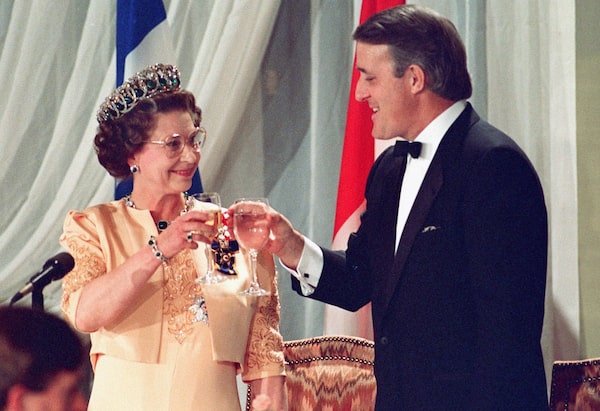
Queen Elizabeth II toasts with Prime Minister Brian Mulroney in Quebec City on Oct. 23, 1987.The Canadian Press
Brian Mulroney says the Queen offered him “unfailing encouragement” when he was spearheading economic sanctions against South Africa’s apartheid regime in the face of strong opposition from Margaret Thatcher and Ronald Reagan.
In a speech to the Royal Commonwealth Society of Toronto Friday evening marking the Queen’s Platinum Jubilee, the former prime minister spoke fondly of the Queen as an “extremely intelligent” woman with “impeccable judgment.”
He paid particular tribute to her for privately backing him in the 1980s as he pushed Commonwealth and G7 countries to isolate South Africa and tighten economic sanctions against the white minority regime.
Mr. Mulroney attributed Canada’s success in leading efforts to abolish apartheid to her “unfailing encouragement and gentle but unerring guidance.”
As prime minister, he strongly supported Black leaders such as president Kenneth Kaunda of Zambia and Zimbabwe’s Robert Mugabe at meetings of the 54-nation Commonwealth in their efforts to impose sanctions on South Africa.
Along with Australia’s Bob Hawke and Indian prime minister Rajiv Gandhi, Mr. Mulroney took on Mrs. Thatcher, the strong-willed British prime minister who opposed concrete sanctions. Mr. Reagan backed Mrs. Thatcher, even though the United States was not a member of the Commonwealth.
During private discussions with the Queen, Mr. Mulroney said she encouraged his efforts to impose tough economic, political and social sanctions on South Africa.
“Throughout it all, Her Majesty was a constant and positive force. In fact, success would never have been achieved without the discreet, gentle and persuasive leadership of Her Majesty The Queen,” he said.
At one private meeting in 1985 in Nassau at the Commonwealth Heads of Government Meeting, Mr. Mulroney said, the Queen personally asked him “to work with other leaders to prevent a major and, some thought, imminent split within the group.”
Sanctions imposed on South Africa over the objections of Mrs. Thatcher eventually led to the end of apartheid and freedom for opposition leader Nelson Mandela in 1990 after almost three decades in prison.
Mr. Mulroney also recounted his first meeting with the Queen, which took place in her suite at a hotel in Moncton in September, 1984, shortly after his landslide election victory.
At one point, he said, Prince Philip entered the suite and poured himself and the Queen a strong Beefeater martini.
“[He] offered me one. When I declined in favour of a soda, he laughed and said, ‘Thank God those charged with running the government stay away from the evil booze.’”
Mr. Mulroney said that later that evening, during a private dinner, the Queen told him about her deep affection for Rose Kennedy, the mother of president John F. Kennedy. Mr. Kennedy’s father, Joe, had served as U.S. ambassador to London from 1938-1940.
“When she and Margaret were young, a relative died, and the two girls were banished to a small room when important guests arrived. Only Rose Kennedy came into the room and chatted with them. They were ignored by the other guests – and she remembered it some 40 years later.”
Mr. Mulroney said he was also struck by the “sparkle of joy and interest” the Queen exhibited during their many conversations. “Even at 96 years of age, and after more than 70 years on the throne, this sparkle has not diminished.”
For subscribers: Get exclusive political news and analysis by signing up for the Politics Briefing.
 Robert Fife
Robert Fife